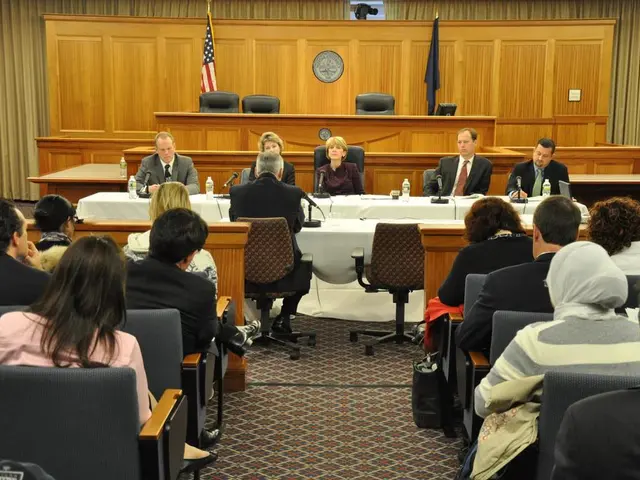U.S. Congress Escalates Institutions' Links with China Scrutiny
The heat's on for American universities as bipartisan scrutiny over their links with Chinese institutions rises to an all-time high. Washington's aggressive crackdown on these ties is garnering attention, with Congress setting its sights on potential foreign influence and technology transfers.
It all started with the Trump Administration's moves, like blocking foreign students from Harvard and putting a pause on new student visa interviews. However, this oversight isn't new; it's been brewing for years.
Senate hearings and reports dating back to 2019 have flagged Chinese government-linked entities using academic collaborations to facilitate technology transfers and compromise research integrity.
Congresspersons, like the outspoken Derek Tran, are ringing the alarm bell, emphasizing that the fast-evolving technological landscape demands a contemporary response from Capitol Hill.
Now, lawmakers aren't just shouting warnings; they're drafting legislation and launching relentless investigations to curb China's academic influence. From revising Section 117 of the Higher Education Act to giving CFIUS new powers, they're building a web of restrictions meant to drastically reduce Chinese involvement in American higher education.
The pressure's mounting on universities to cut ties with Chinese institutions, once perceived as benign collaborations. Early 2025 saw House Select Committee on China Chairman John Moolenaar and House Education Committee Chairman Tim Walberg sending letters to Eastern Michigan University, Oakland University, and the University of Detroit Mercy, urging them to dissolve partnerships with Chinese universities.
Responding to these calls, Eastern Michigan University ended its engineering teaching programs with Guangxi University and Beibu Gulf University. Oakland University followed suit, scrapping programs with three Chinese institutions, while the University of Detroit Mercy is in the process of severing its ties, emphasizing the undergraduate teaching-only focus of these programs.
Universities like Duke haven't escaped scrutiny either, with concern over Duke Kunshan University's potential facilitation of sensitive U.S. technology access by the Chinese government.
Congress has also been probing into Chinese students studying at elite U.S. universities, with the House Select Committee on the Chinese Communist Party requesting data from institutions such as Stanford, focusing on Chinese students' academic backgrounds, research affiliations, and funding sources.
Beyond these partnerships, Harvard is under the spotlight, with lawmakers demanding explanations for collaborations with Chinese entities linked to military and sanctioned organizations. The inquiry revolves around potential dual-use research and partnerships that could indirectly support China's military advancements.
However, not all lawmakers support a blanket ban on Chinese and international students. rep. Ro Khanna, representing Silicon Valley in Congress, advocates for a more nuanced approach, arguing against such measures, stating they would hurt the U.S.'s leadership in the world and contradict its values.
Legislation like the DETERRENT Act, aimed at increasing transparency and reducing foreign influence in U.S. higher education, and restricting funding to universities maintaining relationships with specific Chinese institutions are signs of a growing bipartisan commitment to safeguarding academic institutions from foreign exploitation.
In this new era, American universities must balance their academically driven missions with national security concerns, addressing the increasing scrutiny coming from Capitol Hill. They can no longer rely on academic openness without worrying about potential consequences.
- The debates in Capitol Hill, as seen in Senate hearings and reports from 2019, have emphasized the need for education-and-self-development institutions to pay close attention to foreign influences, focusing particularly on Chinese government-linked entities using academic collaborations for technology transfers and compromising research integrity.
- As policy-and-legislation develops in response to these concerns, lawmakers are drafting legislation and conducting relentless investigations to curb China's academic influence, from revising Section 117 of the Higher Education Act to giving CFIUS new powers, all aimed at drastically reducing Chinese involvement in American higher education.
- In this new era, universities like Harvard, Duke, and many others are under intense scrutiny for their collaborations with Chinese entities, with Congress probing into potential dual-use research, foreign funding sources, and technology transfers that could indirectly support China's military advancements—a clear indication of the growing bipartisan commitment to safeguarding academic institutions from foreign exploitation.






